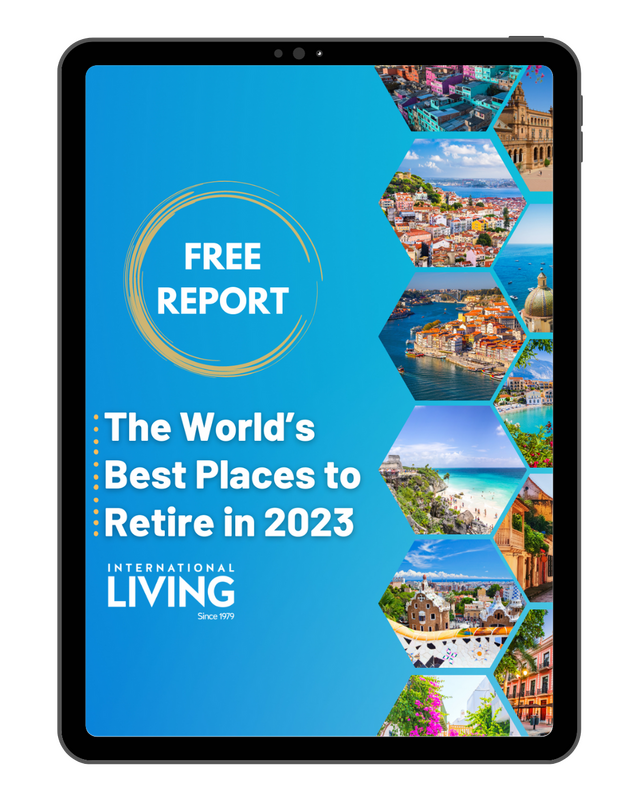Not ready to commit to expat life full-time? No problem: it’s easy to create a flexible, semi-permanent lifestyle abroad—on your terms.
One travel trend that’s becoming increasingly noticeable is the number of North Americans—of every age—embracing long-term overseas life in a less ‘fixed’ way. They’re traveling more leisurely, enjoying months in one place before moving on to the next or even retiring abroad without the commitment of settling in just one country.
Chasing warmer weather, they might spend half the year in Europe and the other half in South America. Others work while they travel, switching to lengthier residency status when they find a country they adore. By making the most of visa options that support a more flexible expat lifestyle, they can be as mobile or as stationary as they like.
Living or retiring abroad is no longer just about shifting from the U.S. to a permanent new home across the ocean. It’s not an all-or-nothing proposal. If you seek a lifestyle offering the freedom to experience a wider range of countries and cultures, there are plenty of options:
- Instead of buying a property abroad, go for affordable long-term rentals that enable you to stay for months at a time
- Sell your house back home to finance your adventures or hang onto it to maintain a U.S. base – the choice is yours
- Apply for extended visas or residency programs to set yourself up in countries that deserve a longer look
- Retire to half a dozen favorite countries instead of picking only one
- Become a digital nomad specializing in ultra-slow travel: five months here, eight months there, working when you need to, and traveling more when you don’t
- Get into volunteering, teaching, and similar opportunities that allow you to stay longer in a country and fully immerse yourself in the local way of life
- If you’re on a fixed budget, stretch your finances by spending most of the year in a country with lower living costs than North America
- ‘Kick the tires’: part-time living is a practical way to get a feel for the culture, language, and living conditions in a new country before diving headfirst into a permanent overseas move
These are just some of the possibilities. They’re all part of a growing movement that’s breaking away from rigid ideas about expat life, embracing new technology that supports working from anywhere, and satisfying a desire to stay abroad longer and live more like a local.
Living abroad part-time is all about spending less, experiencing more, becoming part of a new culture, and keeping your options open. Instead of flitting from one country to the next in a rushed, expensive blur, more and more of us are spending months—or even years—in foreign lands, living at a pace that lets us truly absorb and appreciate the best of global living. And who knows…test-driving the loveliest historical cities in Europe, the quirkiest beach towns in Australia or the most laidback parts of Southeast Asia might turn into a permanent lifestyle—and there’s nothing wrong with that, either.
Types of Part-Time Retirement

There’s no one-size-fits-all approach to a rewarding global life—it depends on your priorities. Here are just a few scenarios worth considering:
Rent Your Home While You Travel
Split your time between the U.S. and life in another country. While abroad, rent out your stateside home. You may also be able to do the reverse, squeezing income from your overseas apartment when you’re not there. This is a brilliant way to boost your travel budget, no matter where in the world you happen to be.
Blend Work and Travel
The digital nomad lifestyle is booming. Whether you’re a serious globe-trotting freelancer or a roving retiree dabbling in occasional work, the ability to combine overseas adventure with some form of ongoing income (often online) opens up myriad possibilities.
Use Your Favorite Destination as a Base for Exploration
Rent long-term in a country that’s ideally positioned near other regions you want to explore. For example, basing yourself in northern Italy gives you quick, easy access to Croatia, Greece, Slovenia, France, Spain, and more by train. A month-long stint in Argentina’s wine country can be broken up with sojourns into Brazil, Uruguay, Chile, and Bolivia.
Follow the Weather
If sunshine and balmy temperatures are a priority, you’re in luck: part-time global living lets you move with the seasons. Slide closer to the equator or switch hemispheres entirely whenever your current location gets too cold. From North America, you needn’t travel far, either: Belize, Panama, Mexico, and Costa Rica are popular places to nab a ‘tropical warmth fix’—and all are just a short flight from Miami.
Try Before You Buy
For many of us, the idea of full-time, permanent retirement to another country can seem pretty intimidating. By dipping your toe in the water first with shorter (but still immersive) stays of several months, you’ll have time enough to answer your most burning questions. How easily will I make friends there? What’s the local shopping really like? How is the infrastructure for residents? Is there enough to see and do in the area to keep me happy? What’s the quality and cost of healthcare?
Living/Retiring Overseas—Part-Time vs. Full-Time

There are several advantages of part-time global retirement over its permanent equivalent. These include:
Wider Range of Visa Options
When staying in individual countries for a few months, you’re better able to take advantage of convenient visa conditions. For example, it’s possible to remain in Europe indefinitely by moving between Schengen Area nations and non-Schengen countries such as Ireland, North Macedonia, Monaco, Croatia, the U.K., Romania, Albania, Montenegro, etc.
A few countries offer surprisingly long stays for U.S. passport-holders. For example, you can visit the Federated States of Micronesia or the Marshall Islands indefinitely. In Albania, Palau, and Georgia (formerly part of Russia), a one-year stay is possible. And if you’re headed to the Bahamas, you’re okay for up to 240 days.
Some expats spend years exploring Latin America, where most countries allow stays of up to 90 days (180 days in Mexico and Panama). Brazil, Peru, Bolivia, and Colombia are incredibly affordable places to live for a few months.
Simpler Housing Arrangements
Buying an overseas property is a big step that not everyone is ready for. The bureaucracy and potential pitfalls can be daunting. Living abroad part-time is far less stressful—it’s more like a series of relaxed, extended vacations.
Airbnb and similar sites provide hefty discounts for stays of a month or more. Or, in a foreign city, just ask your new local friends about affordable apartments in the area. In many countries (Croatia and Spain, for example), timing your visit to avoid the main tourist season can potentially save you thousands of dollars in accommodation costs.
Living Like a Resident is Cheaper Than Travelling Like a Tourist
Settling into a foreign destination as a temporary resident is more culturally rewarding and far more affordable than ‘playing tourist’. By remaining in one spot for months, you may find that your overall expenses work out even cheaper than what you were paying to stay at home in the U.S.
By integrating yourself into an overseas community, you soon learn where to shop, how to find cheap (or free) entertainment, and how to become comfortable in that environment. And because you haven’t spent your life savings buying a house abroad, there’s more money for exploring.
Important Questions to Ask Yourself

Whether you plan to live/retire abroad part-time or full-time, you need to face the realities of overseas living with honesty. Here are a few crucial things to think about before taking the plunge.
How Can You Stay in a New Country Legally?
In most parts of the world, once you get past a visit of more than two to three months, you’ll have to look at other options to stay longer: student visas, workplace sponsorship, country-specific retirement programs, investment visas, etc.
How Much Money Will You Need?
How much will daily life cost? Do you have enough retirement income to live on, or will you have to work as you travel? Basing yourself in some of the world’s cheapest cities (Skopje, Goa, Tbilisi, Puerto Vallarta, Brasov, Cuenca, etc.) can help, but you’ll still need to budget carefully. Will all your credit cards work? Will you need a local bank account? What are the exchange rates like?
Are you Planning to Rent or Buy an Overseas Home?
This choice comes down to how flexible you want to be as you ease into overseas life.
Are You Emotionally Prepared For a Global Move?
Life in a foreign country means moving away from family, friends, and everything familiar. Becoming an expat can be a wonderful experience for adventurous, adaptable, and self-contained people—but any culture shock will be magnified for those who prefer predictable routine and social consistency.
Have You Done Your Research so You Know What to Expect?
Will there be a language barrier? What about personal safety and security issues? Are property prices going up or down? Which parts of the country are more livable? How will you get around? Is the Internet reliable? What will groceries and basic utilities cost? Make sure you have a solid grasp of how daily expat life will work: it’s completely different from being a tourist. Cultural adjustments are inevitable.
How Will Expat Life Affect Your Tax Obligations?
The tax implications of moving abroad can be complicated, so seek expert financial advice. Some countries have tax treaties with the U.S., some allow you to run a business tax-free and others have taxation rates totally different to what you’re used to in the U.S. Know before you go.
What About Health Insurance, Medical Costs, and Quality of Care Abroad?
Healthcare is a vital aspect of overseas living, so look into all the details. Fortunately, medical services abroad are often quite good—and pleasantly cheaper than in the U.S.
What to Look for When Picking a Country

The biggest question for would-be expats is: where do I want to live—and why? Selecting your ideal country should be based on practicalities rather than emotion. There’s a lot to weigh up:
Affordability
The lower your basic living expenses, the better off you’ll be long-term. Compare your preferred country with those around it—how do its prices stack up for accommodation, health services, transport, food, and other must-haves?
Culture, Religion, and Ideology
Does the country match up with your own aspirations, beliefs, and preferred lifestyle? Are you prepared to embrace the differences? Also, will you still be able to pursue your hobbies and interests?
Climate and Geography
Choosing between a history-rich Polish city, a quiet Malaysian beach, or a rainforest hideaway in the Costa Rican mountains is all about drilling down to the type of environment that nourishes your soul and provides the kind of year-round weather and landscape you like.
Travel Accessibility
Will you need to buy a car in your new country, or is public transport readily available? How straightforward is access to other cities and attractions nearby? Just as importantly, how far away are your loved ones, and how easy will it be to arrange occasional visits so you can keep in touch? Check standard prices for flights in and out, too.
Safety
More than 125 of the world’s countries are ranked higher for overall safety than the U.S. It pays to research individual nations to find out how much you’ll need to worry about crime, unrest, natural disasters, political instability, and other issues. According to the Global Peace Index, countries currently ranked in the top 10 for safe living include Denmark, Slovenia, Portugal, New Zealand, and Japan.
Visa Situation
Many nations actively encourage U.S. expats and retirees to take up residence, offering attractive visa conditions and incentivized residency programs. It’s worth examining all possible paths to residency so you know exactly what to expect if you do eventually decide to stay long-term.

Get Your Free Report on the World’s Best Places to Retire:
Learn more about the best places in the world to retire in our daily postcard e-letter.
Simply enter your email address below to sign up for our free daily postcards and we’ll also send you a FREE report on The World’s Top 10 Retirement Havens, plus access to over 10 more free reports. Our gift to you, on our favorite destinations.
Related Articles
The World’s Best Places to Retire
The Cheapest Places in the World to Live
5 Great Places to Retire Where it’s Easy to Fit In
Upcoming Conferences
The Only 2024 Fast Track Panama Conference
If your dream retirement involves stunning beaches… lush green mountains… a warm climate with no hurricanes… first-rate healthcare… incredible value for money (a couple can live well on $2,200 a month)… and the World’s #1 Retiree Discount Program…
Join our Panama experts and expats in February and discover why Panama could be your perfect paradise.


.png)